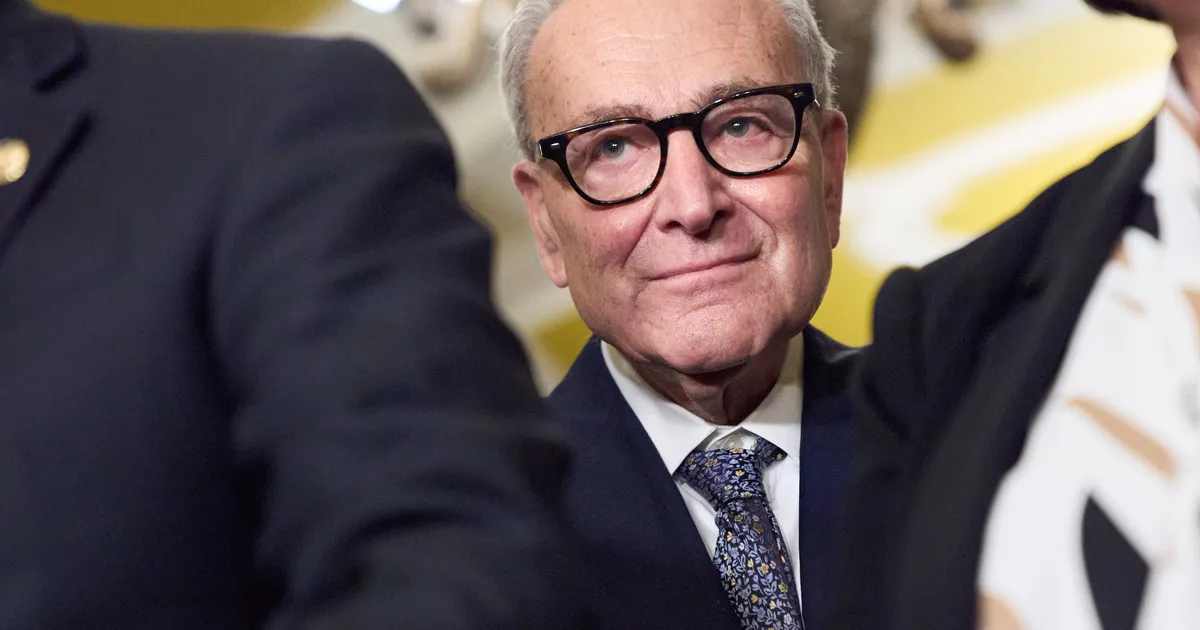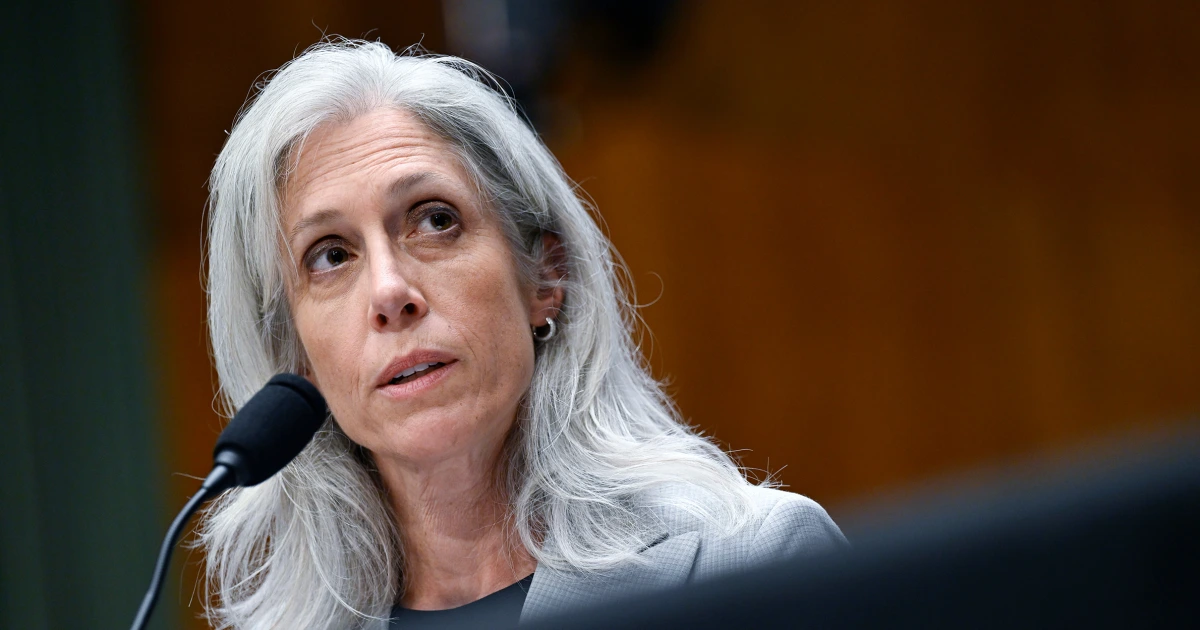
LOADINGERROR LOADING
Government shutdowns, as a rule, do not work.
Republicans did not manage to repeal Obamacare in 2013. Another shutdown, launched in January 2018, resulted in no long-term changes to the American government. And even in his first term, President Donald Trump was unable to persuade Democrats to fork over $5.7 billion for border wall construction despite a 35-day shutdown that covered most of January 2019.
They also generally don’t change the political environment very much. Congressional Republicans’ poll numbers plummeted during the 2013 shutdown but rebounded well before the 2014 midterms ended in a red wave. Republicans swore Democrats would pay a political price for the 2018 and 2019 shutdowns, but those were similarly afterthoughts by the time the midterms rolled around.
Advertisement
This history, however, is not stopping the Democratic Party from insisting that withholding their votes from a continuing resolution in the Senate just might work this time, and that they can convince Republicans to extend Obamacare subsidies or at least make the GOP look callous by highlighting how health care costs for millions of Americans are set to spike.
They do good reason to think so: Polling generally indicates voters are ready to blame Trump and the Republicans for any shutdown. And compared to demands like a total repeal of Obamacare or the construction of a wall on the U.S.-Mexico border, voters see the Democratic ask for health care subsidies as reasonable.
“We believe this issue is a real, real issue for the American people,” Senate Minority Leader Chuck Schumer of New York told reporters Wednesday when asked why this shutdown would be different. “We also believe that when there’s a Republican president, a Republican Senate and a Republican House, the natural inclination is to blame the Republicans.”
Advertisement
But with elements of the Democratic Party’s unified front already going wobbly ― three members of the Senate Democratic Caucus voted for the GOP plan to reopen the government on Tuesday shortly before the official shutdown ― there are reasons to think the party’s ongoing messaging struggles and general lack of unity since Trump’s election will matter enough to leave them just as empty-handed as the GOP more than a decade ago.
Here are three reasons the shutdown could work out for Democrats, and two reasons why it might not.
Yes: The Big Fundamentals
Voters know Republicans don’t like government, and know Republicans control the Senate, House and White House, making them seemingly the natural targets of voter anger. It’s also not difficult to convince them that Trump, an unpopular president not exactly known for his level-headedness, is being unreasonable over demands that Democrats are framing as an attempt to bring down costs for everyday people.
“Republicans have backed themselves into a corner where they demand to end tax credits for health insurance costs or else they’re shutting down the government,” said Jesse Ferguson, a veteran Democratic strategist. “People won’t buy it. Their ransom note reads: ‘Higher bills or closed doors — pick one.’”
Advertisement
Early polling on a shutdown supports this reading: An NPR/PBS/Marist Poll conducted in recent days found that 38% of Americans would blame Republicans, while 27% would blame Democrats, and 31% would blame both parties equally. A late September survey from Blueprint, a Democratic group, which forced respondents to choose between Democrats and Republicans, found an even bigger advantage: 50% of registered voters would blame Republicans, 34% would blame Democrats.
Yes: Health Care, Health Care, Health Care
Democrats’ inability to drive news cycles in the Trump era is a well-defined problem at this point, but the shutdown is enough of a high-profile event to switch the national topic of conversation to one of Democrats’ best issues, and one of Trump’s worst ones.
The ad wars tell part of the tale and showcase how confident Democrats are in their argument. Five different Democratic groups are up with ads attacking various Republicans over the shutdown, including GOP House members, the party’s nominee for Virginia governor and Sens. Susan Collins (R-Maine) and Dan Sullivan (R-Alaska). The ads generally tie the shutdown together with tariffs imposed by Trump and with cuts to Medicaid included in the GOP’s budget law.
Advertisement
“Susan Collins voted to support cutting Medicaid and raising health care costs,” a female narrator says in a representative ad from Majority Forward, a nonprofit controlled by Schumer allies. “She’s even willing to shut down the government to do it.” (Collins voted against the final legislation containing the Medicaid cuts, but voted to advance the bill earlier in the process.)
Republicans, meanwhile, seem less enthused about the debate. The National Republican Congressional Committee is up with ads in 42 competitive House districts accusing Democrats of “grinding America to a halt in order to give illegal immigrants free health care.” However, they are spending a scant “four figures” on the ads, according to Fox News.
Advertisement
Yes: Trump Trip-Ups
Democrats also seem confident that they can capitalize on the two-track messaging that Republicans are attempting to deploy. They argue that both a shutdown would be terrible and suggest that it would give hardline Office of Management and Budget chief Russ Vought unprecedented power to cut federal spending and lay off even more federal workers. The hope is that Vought’s threatened cuts will give the Trump administration additional leverage over Democrats who want to avoid additional decimation of the government.
“We’re doing well as a country, so the last thing we want to do is shut it down,” Trump said on Tuesday in the Oval Office. “But a lot of good can come from shutdowns. We get rid of a lot of things that we didn’t want, and they’d be Democrat things.”
Advertisement
The problem here is that Democrats do not actually believe the law is meaningfully holding back Vought or Trump from enacting cuts, particularly given their history of doing as they please, supported by a compliant conservative U.S. Supreme Court. So, what has been stopping Vought from enacting these threatened cuts before? Politics.
When Elon Musk embarked on his slash-and-burn quest across the federal government, opposition mounted ― loudly from the public and more quietly from both GOP members of Congress and Trump’s cabinet. All of those forces still oppose deeper cuts, and enacting them would only cause political pain for the White House and the GOP.
The initial cuts announced by Vought ― a suspension of funding for infrastructure projects, including the Gateway Tunnel and the Second Avenue Subway in deep-blue New York City ― do not appear to be directly related to the shutdown. And they almost immediately caused problems for the GOP.
Advertisement
Rep. Mikie Sherrill, the Democratic nominee for governor of New Jersey, immediately used the cuts to attack her Republican opponent, Trump supporter Jack Ciattarelli, because construction of the Gateway Tunnel will speed up commute times for New Jersey suburbanites heading into New York City.
“As governor, I will fight tooth and nail to complete this essential infrastructure project for New Jersey,” Sherill said. “Jack Ciattarelli will not. He’s refused to name a single area where he disagrees with Trump and has already said he would never sue the Trump administration. He will choose Trump over New Jersey every time. Make no mistake: When I’m governor, I will see them in court and deliver Gateway for New Jersey.”
If Vought aims to keep cutting, he could also keep delivering attack opportunities for Democrats.
No: Beware Of The Everything Bagel
Democrats are trying to keep their demands simple: Extend the Obamacare subsidies. But to suggest the major reason Democratic base voters are angry with Trump is his refusal to properly fund health care is foolhardy. And right now, Democrats are not making any asks that could realistically rein in Trump’s authoritarian tendencies, as their base desires.
Advertisement
This means there’s a real temptation for Democrats to drift off topic, limiting the advantage the party theoretically gets from a focus on health care.
At a gathering of progressive operatives and donors on Tuesday, the crowd literally laughed at a social media post from House Democratic Leader Hakeem Jeffries: “The Trump administration’s threat to deploy troops in Portland is unlawful. Here’s a thought. Focus on protecting the healthcare of the American people.”
Anat Shenker-Osorio, a progressive strategist who spoke at the conference sponsored by Way To Win, neatly summed up the reaction and how the Democrats’ shutdown strategy is far from totally cohesive. “Either we are in the midst of a fascist power grab or we’re negotiating with a standard right-wing administration,” Shenker-Osorio said. “Both can’t be true at the same time.”
Advertisement
Establishment Democrats, however, are worried about Democrats falling for the “everything bagel” trap and muddying their demands and a relatively clear message to the public. Rep. Greg Casar, who chairs the Congressional Progressive Caucus, emphasized the only way to fully defeat Trump was at the ballot box.
“We’re all deeply appalled by Trump’s corruption and lawlessness,” said Casar, who also spoke at the event. “But Donald Trump isn’t going to pinky promise to the Democrats in a vote that he’s going to stop being authoritarian. We stop Donald Trump from being authoritarian by beating him.”
No: Play It Out
The Democrats’ biggest enemy may simply be time. Republicans only need to convince five additional Democratic senators to break the shutdown, since they can easily pass a continuing resolution through the GOP-controlled House. Moderate Senators of both parties are already growing antsy about the shutdown, so that a deal could come in relatively soon.
Advertisement
TruthSavesLives
Your SupportFuelsOur Mission
Your SupportFuelsOur Mission
Dangerous myths about medicine spread fastest when watchdogs are silenced. Become a member today and help us safeguard science, protect health, and keep the public informed.
We remain committed to providing you with the unflinching, fact-based journalism everyone deserves.
Thank you again for your support along the way. We’re truly grateful for readers like you! Your initial support helped get us here and bolstered our newsroom, which kept us strong during uncertain times. Now as we continue, we need your help more than ever. We hope you will join us once again.
We remain committed to providing you with the unflinching, fact-based journalism everyone deserves.
Thank you again for your support along the way. We’re truly grateful for readers like you! Your initial support helped get us here and bolstered our newsroom, which kept us strong during uncertain times. Now as we continue, we need your help more than ever. We hope you will join us once again.
Support HuffPost
Already contributed? Log in to hide these messages.
However, if the constituent pressure never materializes, it can be challenging to envision moderate Democrats, such as Sen. Gary Peters (D-Mich.) or Sen. Jacky Rosen (D-Nev.), holding the line for an extended period. Democrats could struggle to find a deal that placates their base and end up in the same place Republicans did back in 2013, having waged a fight whose only tangible result is to deepen intra-party divides.



